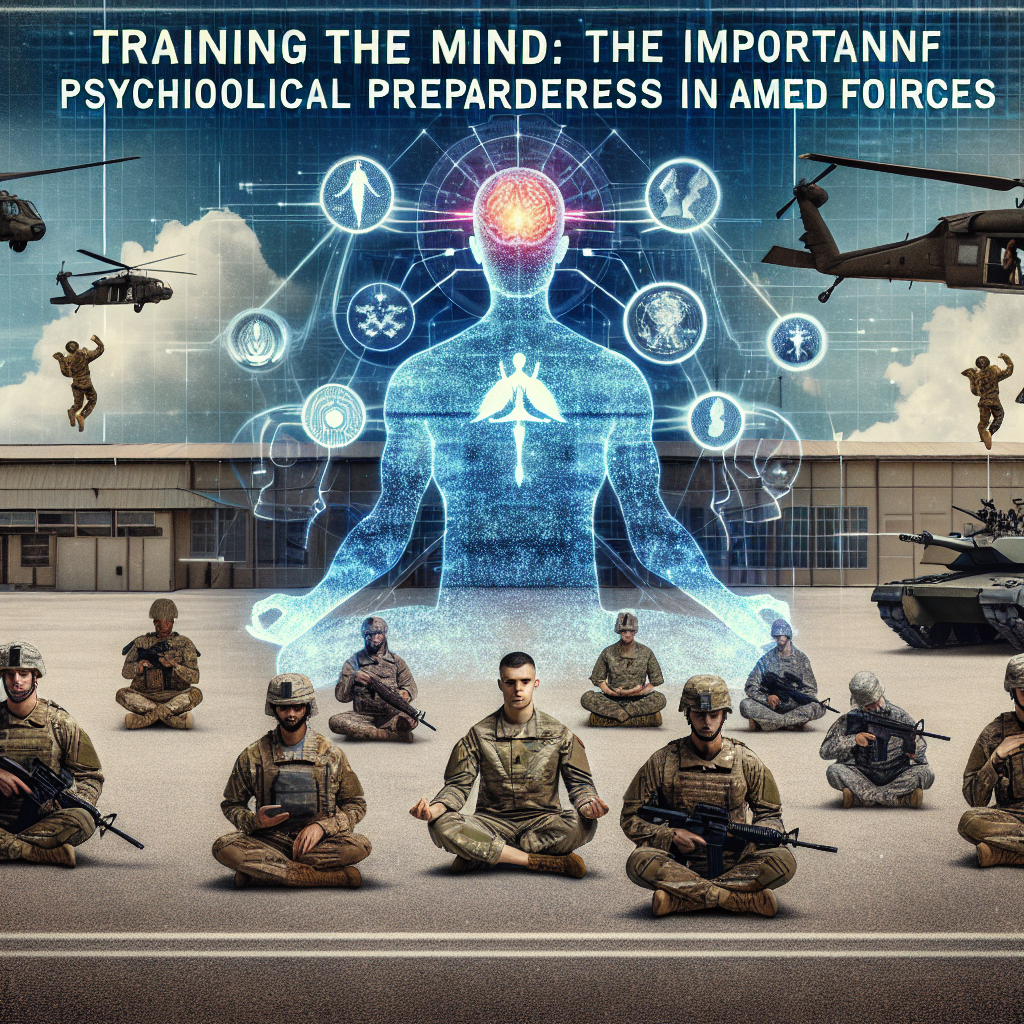
Introduction
In the high-stakes world of armed forces, the edge between success and failure often lies not just in physical strength or strategic superiority, but in the depths of one’s psychological resilience. Training the Mind: The Importance of Psychological Preparedness in Armed Forces is a concept that has never been more relevant. As conflicts become more complex, the necessity for psychological readiness has surged. This article delves into the multifaceted approach to psychological preparedness, highlighting its significance through compelling case studies and expert insights, ensuring a comprehensive understanding of why mental fortitude is essential for those who serve.
The Foundation of Psychological Preparedness
Understanding Psychological Preparedness
Psychological preparedness refers to the mental state that allows an individual to face adverse situations effectively. For armed forces personnel, this includes coping with stress, making quick decisions, and maintaining composure under pressure.
Key Components of Psychological Preparedness:
- Resilience: The ability to bounce back from challenges.
- Cognitive Flexibility: The capability to adapt thinking and behavior in response to changing circumstances.
- Emotional Regulation: Managing emotions effectively to respond appropriately in high-stress situations.
Ultimately, Training the Mind: The Importance of Psychological Preparedness in Armed Forces centers around enabling service members to confront the psychological trials of military life.
Impact of Psychological Readiness on Performance
Research consistently underscores that psychological preparedness significantly affects performance. A study by the U.S. Army Research Institute found that soldiers with high mental resilience performed better in combat simulations than their less resilient peers. This indicates a clear link between psychological training and mission success.
Integrating Psychological Training in Military Protocols
Evolution of Training Programs
Historically, armed forces primarily focused on physical and tactical training. However, recognizing the critical role of mental health, modern military training programs increasingly incorporate psychological elements.
| Table: Comparison of Historical and Modern Training Methods | Aspect | Historical Approach | Modern Approach |
|---|---|---|---|
| Focus | Physical fitness | Psychological and emotional health | |
| Assessment | Physical readiness tests | Psychological evaluations | |
| Training Methods | Drill and physical exercises | Scenario-based simulations | |
| Support Systems | Limited mental health resources | Comprehensive mental health support |
Case Study: The Army’s Comprehensive Soldier Fitness Program
The U.S. Army’s Comprehensive Soldier Fitness (CSF) program emphasizes mental resilience training. Implemented after the recognition of PTSD rates among veterans, this program equips soldiers with skills to deal effectively with stress and trauma.
Relevance Analysis: The CSF program illustrates the pivotal shift toward acknowledging psychological readiness as an integral component of military success, showcasing measurable improvements in soldier performance and morale.
Psychological Preparedness and Combat Stress
Understanding Combat Stress
Combat stress can be debilitating, affecting decision-making and overall performance. Without proper psychological training, soldiers may struggle with anxiety, panic attacks, and even long-term conditions such as PTSD.
Strategies for Managing Combat Stress
- Mindfulness Training: Incorporating mindfulness techniques can help soldiers remain present and focused.
- Cognitive Behavioral Techniques: This includes reframing negative thoughts to foster resilience and adaptability during intense situations.
- Peer Support Programs: Promoting camaraderie among soldiers can create a supportive environment that encourages open discussion about mental health.
Leveraging Technology for Psychological Training
Virtual Reality in Training
Innovative technologies like Virtual Reality (VR) are being harnessed to simulate high-stress environments, allowing soldiers to practice psychological preparedness in a safe setting.
Case Study: Army’s Use of VR Simulations
The U.S. Army has implemented VR scenarios for soldiers to engage in realistic combat simulations. This technique allows service members to experience stressors in a controlled environment, improving their response to actual combat situations.
Relevance Analysis: The proactive use of technology exemplifies how modern armed forces are advancing psychological training and preparing service members for the battles they may face, both on and off the field.
The Role of Leadership in Mental Preparedness
Leadership’s Influence on Psychological Training
Leadership in the armed forces plays a critical role in fostering an environment that promotes psychological wellness. Leaders who prioritize psychological training set the tone for their units, encouraging open discussions about mental health.
Key Actions for Leaders:
- Modeling Vulnerability: Leaders who share their own mental health struggles foster an environment of trust.
- Promoting Training: Actively encouraging participation in psychological readiness programs increases unit cohesion and readiness.
Combatting Stigma Surrounding Mental Health
The Stigma in Armed Forces
Despite advances in mental health awareness, a stigma persists around seeking help within military culture. Many service members fear that reporting mental health issues may hinder their career progress.
Breaking the Stigma
- Awareness Campaigns: Conducting campaigns to educate personnel about the importance of mental health can diminish stigma.
- Promoting Success Stories: Highlighting successful leaders who’ve prioritized mental health can inspire others to follow suit.
Conclusion
Training the Mind: The Importance of Psychological Preparedness in Armed Forces cannot be underestimated. As we witness an evolution in military training approaches, prioritizing mental resilience will undoubtedly shape the future of armed forces. By adopting comprehensive psychological training programs, embracing innovative technologies, and fostering a transparent culture around mental health, the armed forces can ensure that personnel are as prepared mentally as they are physically.
As you reflect on the critical nature of mental preparedness, remember that each individual’s psychological strength not only contributes to their success but also to the collective strength of their unit. Investing in psychological wellness is not just beneficial; it is essential.
FAQs
1. Why is psychological preparedness crucial for armed forces?
Psychological preparedness equips service members to handle stress, make quick decisions, and maintain focus in high-pressure situations, ultimately enhancing overall mission success.
2. How does leadership impact psychological training?
Leaders play a pivotal role in fostering a culture that prioritizes mental wellness, encourages open communication, and reduces stigma surrounding mental health.
3. What are practical techniques for building psychological resilience?
Techniques such as mindfulness training, cognitive behavioral strategies, and peer support programs are vital for enhancing psychological resilience among soldiers.
4. How is technology shaping psychological training in the armed forces?
Innovative technologies, particularly VR, are being utilized to simulate high-stress environments, training soldiers to develop mental resilience in combat-like scenarios.
5. What actions can help combat the stigma associated with mental health in the military?
Campaigns to raise awareness, sharing success stories of military leaders prioritizing mental health, and creating an open environment for discussion are effective strategies for reducing stigma.
In the words of a renowned military leader, “You must be a leader who understands that strength comes from both the body and the mind.” Prioritizing mental resilience is essential as we navigate the complexities of modern warfare. Embrace psychological preparedness; it is a revolutionizing force in the armed forces.

















